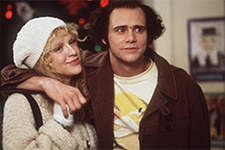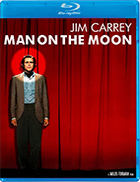Man on the Moon [Blu-Ray]
|

The primary problem faced by filmmakers who attempt to make biopics of well-known celebrities is the impossibility of capturing a person's essence in two hours of screen time. Biographers write hundreds, sometimes thousands, of pages trying to explain their subjects and what made them unique. To do this in a two- or three-hour movie is close to impossible, which is why so many biopics are deeply unsatisfying, both as history and as entertainment. In this respect, Milos Forman's Man on the Moon is arguably exempt from this particular problem because the movie's subject, comedian / actor / performance artist / practical jokster Andy Kaufman, is completely unknowable. Even those who were closest to him during his life profess that they haven't the slightest inkling about what made him tick. He was a deranged lunatic on-stage who used meditation techniques to keep his life in balance, although there was never evidence of any balance (I was reminded of the funny, contradictory line in A Fish Called Wanda when Kevin Kline's character declares that he is using a Buddhist meditation technique to focus his aggression). Man on the Moon in no way tries to dissect the character of Andy Kaufman. Screenwriters Scott Alexander and Larry Karaszewski, who had previously written two fine biopics, Tim Burton's Ed Wood (1994) and Forman's The People vs. Larry Flynt (1996), present Kaufman as an impenetrable subject, a human mystery who was as baffling as he was brilliant. At one point in the movie, Kaufman (Jim Carrey) tells his girlfriend, "You don't know the real me," to which she replies quite rightly, "Andy, there is no real you." The film opens with a Kaufmanesque (or is that Kafkaesque?) cinematic practical joke and then proceeds to follow Kaufman's life from being a little boy who performed his own TV shows in his bedroom ("It's not healthy," his father tells him. "You should be outside playing sports"), to his unexpected death from a rare form of cancer at the age of 35. In-between are meticulous recreations of pivotal moments in Kaufman's career, including his musical performance on the first episode of Saturday Night Live, in which he lip-synched the "Mighty Mouse" theme song while it played on a record player, but only during the portion when Mighty Mouse sang, "Here I come to save the day!"; his frequent appearances as his alter-ego, the slimy, obnoxious Las Vegas lounge singer Tony Clifton; his stint on the sitcom Taxi; his infamous "milk and cookies" concert at Carnegie Hall; and his overlong involvement in professional wrestling, particularly a vicious rivalry with pro wrestler Jerry Lawler (who plays himself in the movie). What made Kaufman's life and career so fascinating and so frustrating is that no one ever knew what was real and what wasn't. Much of his existence was something of a practical joke—an extended hoax that rewrote the rules about how a performer must deal with his audience. Even when he gathered his closest friends together to tell them he was dying of cancer, they weren't sure whether or not to believe him. At one point in the film, Kaufman explains that he views life as an "illusion," which is how he lived. Everything about him was some form of illusion, even in his private realm. His agent, George Shapiro (Danny DeVito), never knew what to expect from him. Neither did his girlfriend, Lynne (CourtneyLove), who at one point in the film finds that Kaufman has used her in one of his hoaxes, and she declares, "Don't ever use me as a prop again!" Of course, this is how Kaufman and his friend / confidante / partner Bob Zmuda (Paul Giamatti) viewed people: as props to be manipulated in their persistent quest for new and innovative practical jokes. And, as Shapiro points out, most of their jokes were funny to only two people: Kaufman and Zmuda. Yet, Kaufman was a great success in the late '70s despite his frequent attempts to alienate himself from the audience. His involvement in professional wrestling (like wrestling itself, it was nothing more than an elaborate, exquisitely planned and executed sham) was about being the bad guy. Kaufman wanted audiences to hate him, and he did everything he could, from cursing and degrading women, to mocking audience members' hygiene. When Shapiro complains that the next time Kaufman performs, women will picket, Kaufman's eyes light up like a boy on Christmas morning, and he says with giddy anticipation, "Do you think so?" In this respect, Kaufman was the ultimate radical: a man whose own personal vision of himself could never be thwarted by anyone—not by his agent, not by his parents, not by his girlfriend, and certainly not by the public. Therefore, he fits perfectly into Forman's cinematic gallery of social misfits, including the defiant mental patient McMurphy in One Flew Over the Cuckoo's Nest (1975), the absurdly giggling, flatulent Mozart in Amadeus (1984), and the porn sleaze king Larry Flynt in The People vs. Larry Flynt. What all these characters have in common is not only their determination to buck the system, but also the sad fact that the system always takes its toll. Of all these characters, Larry Flynt is the only one to emerge alive at the end of his movie, and even though he has been victorious in a Supreme Court battle to protect freedom of speech, the movie closes on a bittersweet moment, suggesting that the victory has still been tinged with too many defeats along the way. Central to the success of Man on the Moon is the performance by Jim Carrey, whose wide-ranging talent as an actor and comedian finally came to full bloom here (an entire documentary about his experience making the film, titled Jim & Andy: The Great Beyond, was released in 2017). In The Truman Show (1998), Carry had demonstrated that there was much more to him than the rubber-faced antics and butt jokes that had initially made him a star, and here he shows that he is capable of completely embodying a character in a way that you forget it is Jim Carrey on-screen and not Andy Kaufman. Anyone who is familiar with Kaufman's style will immediately recognize the absolute precision with which Carrey has appropriated his facial expressions, gestures, and various vocal personas. Whether he is playing Tony Clifton or Latka, the foreign mechanic on Taxi, Carrey is Kaufman. The supporting cast fills in the rest of the film nicely, especially reliable character actor Paul Giamatti (Private Parts, Saving Private Ryan) as Bob Zmuda. Giamatti has the same kind of manic eye as Carrey's Kaufman, and when they are together scheming their latest prank, you can almost feel them reading each other's minds. Danny DeVito works well as Kaufman's agent, in a bit of bizarre casting because DeVito co-starred with Kaufman on Taxi (many of the other Taxi co-stars appear as themselves in the movie, looking decidedly older than they were in the late '70s). Courtney Love does not fare as well as Lynne because she is so underdeveloped as a character; we never have any sense of who she is and why she would stay with someone like Kaufman. Despite Kaufman's unknowability, the movie would have benefited from a more nuanced look at their relationship. As it stands, it feels like an unnecessary subplot that could be eliminated and never be missed. By the time we get to the end of the film, and Kaufman is weak with cancer, bald from radiation therapy, and still wishing desperately to perform, his humanity has sneaked out from behind his many facades. Near the end of the film there is a bitterly ironic moment in which Kaufman goes to the Phillipines for what he thinks will be a miracle cure, only to find that he is the victim of a farcical money-making scheme. In the end, the ultimate prankster finds himself, on his deathbed, the butt of the ultimate prank—the one that means the difference between life and death—and, in true Kaufman fashion, all he can do is laugh.
Copyright © 2022 James Kendrick Thoughts? E-mail James Kendrick All images copyright © Universal / Kino Lorber | |||||||||||||||||||||||||||||
Overall Rating:



 (3.5)
(3.5)
Subscribe and Follow
Get a daily dose of Africa Leader news through our daily email, its complimentary and keeps you fully up to date with world and business news as well.
News RELEASES
Publish news of your business, community or sports group, personnel appointments, major event and more by submitting a news release to Africa Leader.
More Information
